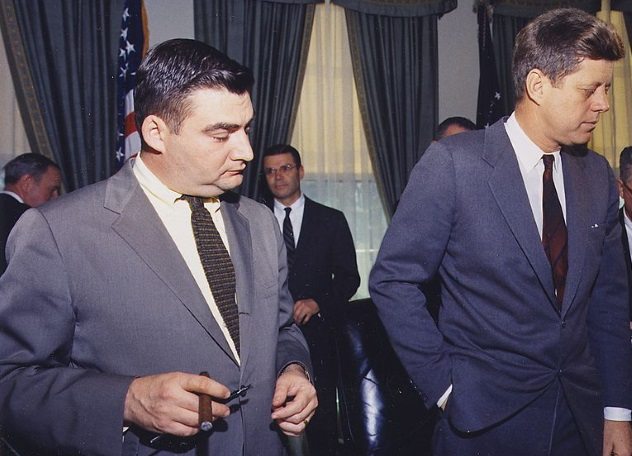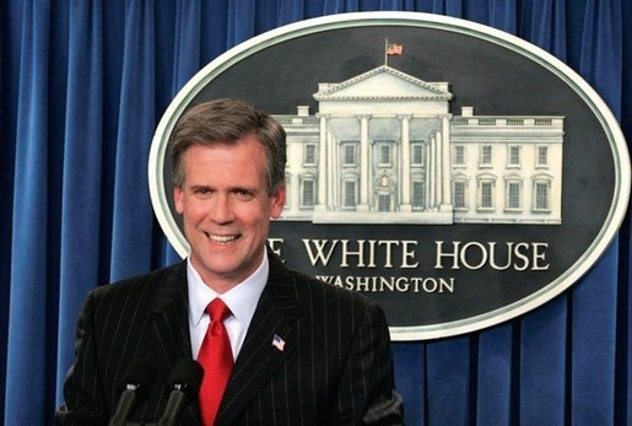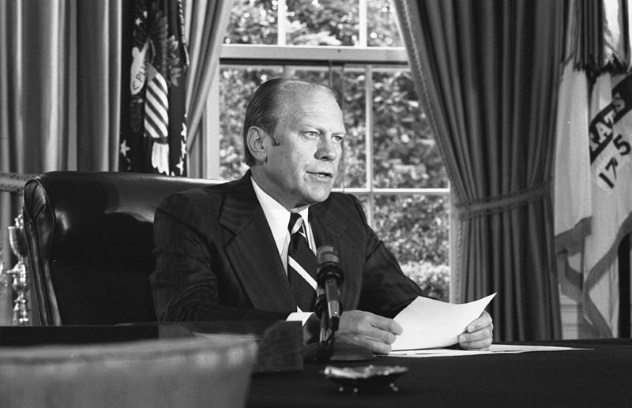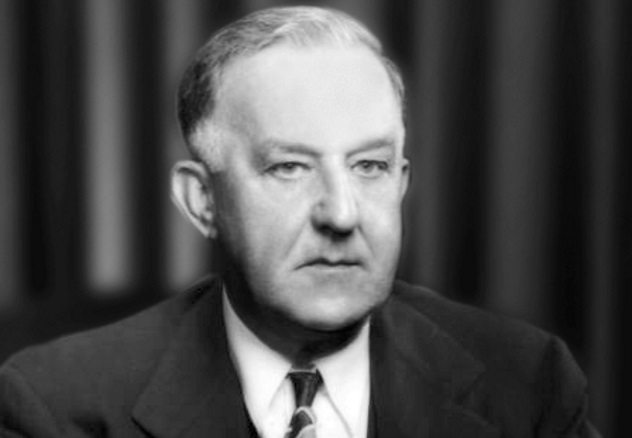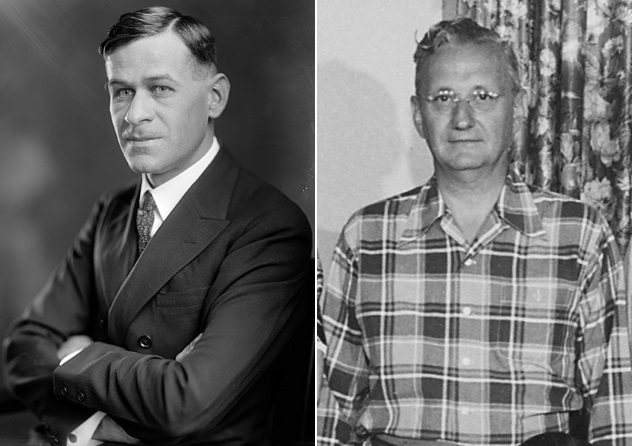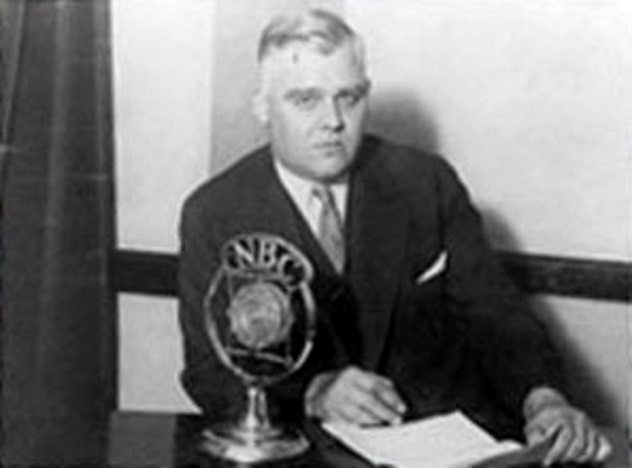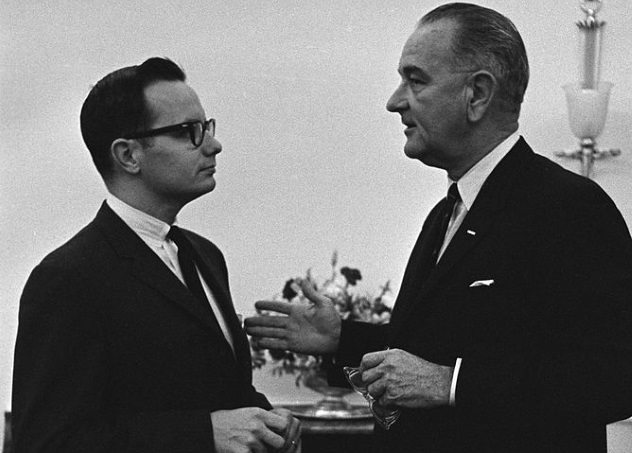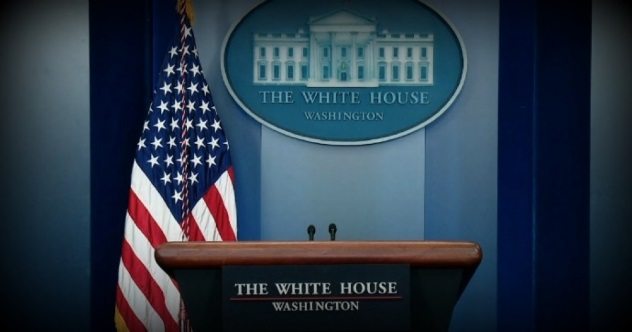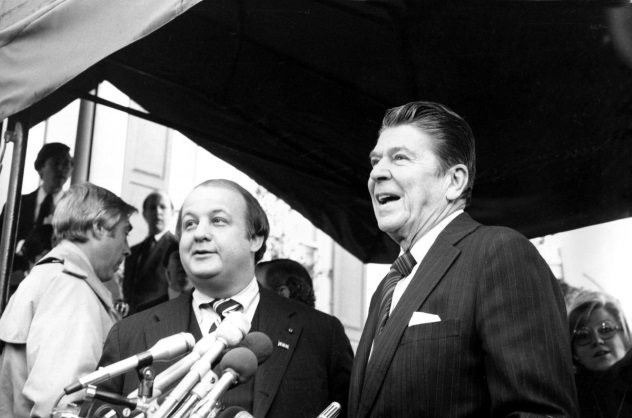Some influenced the practices of both their administration and future ones, others grappled with the choices made by their commanders in chief, and a few died on the job. All of them certainly had interesting tenures. The following examines the lives of ten former press secretaries and how their influence shaped administrations in addition to little-known dark secrets forgotten in history.
10 Salinger, Jackie, And The Arts
At the height of the Cold War, the White House press secretary under President John F. Kennedy was Pierre Salinger. With Kennedy’s approval, Salinger was the first to conduct news conferences on live television broadcasts, managing the still-new medium with “wit, enthusiasm, and considerable disdain for detail.” Salinger’s contribution to the Kennedy administration, however, went far beyond the scope of simply dealing with the White House press corps. A child prodigy, Salinger was a self-taught pianist who learned to play the grand piano before he learned to read. His lifelong zest for music was instrumental in incorporating politics and art, with the insistence and guidance of Jackie Kennedy. “If Jackie Kennedy was the one who thought maybe America was ready for a higher culture, her ally in it or her agent was Pierre,” said Richard Reeves, author of President Kennedy: Profile of Power. According to Salinger, “It was important to demonstrate that the White House could be an influence in encouraging public acceptance of the arts.” Due to this belief and with the utmost support of Jackie, artists who had been silenced in the McCarthy era began to emerge from the shadows, fighting against the politics of exclusion. In Kennedy’s first year in office, Jackie had a permanent stage installed in the White House and hosted numerous performances by various artists, such as cellist Pablo Casals, a Shakespeare troupe, and the Metropolitan Opera.[1]
9 Public Humiliation
In August 1973, President Richard Nixon was facing a special prosecutor overseeing the Watergate scandal. By now, the president’s psyche and temperament were on the verge of breaking point with the end of his administration in sight. While making his first public appearance in months at a veterans’ convention in New Orleans, the frustration that was evidently wearing on Nixon was made apparent for the world to see. As the president made his way to the convention hall, Press Secretary Ron Ziegler—who referred to Watergate as a simple “third-rate burglary”—perhaps did something wrong. Nixon, irritated, grabbed Ziegler by the shoulders, spun him around, and forcefully shoved him away.[2] “Even by Nixon’s usual standards, his behavior in New Orleans was bizarre,” wrote historian David Greenberg. CBS News correspondent Dan Rather captured the incident, releasing the footage that evening, stating, “What you are about to see is a rare glimpse in public of presidential irritation.” Nixon’s mental health was called into question not only by reporters covering his downfall but by White House staff as well. In time, Press Secretary Ziegler forgave his boss, stating, “I understood the situation fully. Obviously, I was humiliated.” Ron Ziegler passed away in February 2003 at the age of 63.
8 Rock ‘N’ Roll Press Secretary
It would come as a surprise to many that Tony Snow’s perceived character of a conservative professional differed drastically from his personal life. Aside from being known as a press secretary, a political commentator, and a syndicated columnist, Snow was an avid musician who could play “just about anything.” In fact, when he wasn’t at the White House briefing the press corps, he could be found in area bars or clubs at night playing blues rock with his cover band, Beats Workin’. Snow wasn’t the only recognizable face onstage, however, often playing with his guitarist friend Skunk Baxter (The Doobie Brothers and Steely Dan) and Ian Anderson (Jethro Tull). After playing publicly for numerous years, Snow was featured on an episode of VH1 Classic’s Rock ‘n Roll Fantasy Camp. Despite his surprising extracurricular activities, Snow was the epitome of professionalism, even as he struggled through the pain of surgery and chemotherapy. Working to the very end, George W. Bush’s press secretary kept his illness private while maintaining a heavy speaking schedule, “trying to earn enough money to leave his family in good financial shape.” Snow died on July 12, 2008, at the age of 53, as a result of colon cancer, which also claimed his mother’s life when he was 17. Following his passing, President Bush lauded Snow as a man who “brought a certain civility to this very contentious job.”[3]
7 Morality
In the days following the pardon of Richard Nixon by President Gerald Ford, the White House received thousands of telegrams, letters, and messages from an outraged public. Citizens from around the country felt that the pardon continued the Watergate cover-up by “preventing the possible indictment of the former President.” In addition to the collapse of the administration’s public image, many believed that the pardon was part of a “secret deal” between Nixon and Ford. To make matters worse, the incensed and demanding press corps were met with an empty podium when Press Secretary Jerald terHorst abruptly resigned after being informed of the pardon merely 24 hours prior. In spite of being a longtime friend of Ford’s, terHorst felt that he could not in good conscience defend the president’s decision: “It wasn’t so much that I objected to the pardon as it was that it set one man above the law. We don’t do that in our country. Presidents are not exemptions to the law.” And so, with the stroke of a pen just 31 days into his presidency, Ford and terHorst parted ways, ending a friendship that spanned over 25 years. Two months after his resignation, terHorst published Gerald Ford and the Future of the Presidency, in which he continued to ridicule Ford’s judgment while demanding accountability, stating, “How could Ford grant an unconditional pardon to the former President without getting in return a signed ‘confession’ of his Watergate participation?”[4]
6 Open-Door Policy
During World War II, President Franklin D. Roosevelt was adamant on creating an easier way for reporters to gain meaningful news. Therefore, Roosevelt instructed his press secretary, Stephen Early, to adopt an “open-door policy with all correspondents.” Understanding the newspaper business, given that his chosen career was journalism, Early strived for the presence of African American reporters during presidential press conferences.[5] Prior to this, black correspondents were prohibited from attending the administration’s news briefings. Nevertheless, Early tirelessly made countless attempts to persuade the White House Correspondence Association to issue press credentials. Due to Early’s efforts, Harry McAlpin of the National Negro Publishers Association became the first African American reporter to be part of the White House press corps in 1944. In 2016, President Obama honored McAlpin, quoting President Roosevelt’s words to the young reporter. “I’m glad to see you, McAlpin,” said Roosevelt as he flashed his famous smile and stuck out his hand to the correspondent. “And very happy to have you here.”
5 ‘I Feel As If I Killed Them’
When it rains, it pours. Such was the case for President Harry S. Truman when he lost not only one but two press secretaries to sudden, fatal heart attacks within two years of each other. Dating back to his grade school years in Independence, Missouri, Truman and his boyhood friend, Charles G. Ross, would take separate career paths, only to reunite in Washington when Ross was appointed to be his press secretary in 1945. Aside from engaging reporters with his amusing banter, Ross was a close aide as well as an adviser to the president. Moments after a press and radio conference held on the afternoon of December 5, 1950, Ross abruptly collapsed and died at his desk in the White House.[6] His position as press secretary was filled by Joseph H. Short Jr., a stubborn man who had a reputation for being a notorious hothead. The characters of Ross and Short were extraordinarily dissimilar. In fact, it seemed as if the only parallel between the two was their demise. Nearly two years after Ross’s passing, Short was dead of a heart attack at the age of 48. After the unexpected death of Short, Truman lamented, “I feel as if I killed them.”
4 Early 20th-Century Controversy
George E. Akerson, the country’s first press secretary under President Herbert Hoover, was used to putting out scandalous fires. However, in 1927, a scandal which would be ludicrous by today’s standards hit the papers, sending Hoover’s presidential campaign into a tailspin.[7] While touring flood relief work in Mississippi, “whispering” stories began circulating that Hoover had danced with Mary Booze, a national committee woman. The basis of the contention was not the fact that the two hit the dance floor together but that Mary was black. What would be an inconsequential headline in the 21st century was, sadly, disastrous for a political career nearly a century ago. Thus, in an attempt to dismiss the “slander” during a bitter presidential campaign, Akerson immediately responded, stating that the claims were “unqualifiedly false.” Nonetheless, the story was repeated by Governor Theodore G. Bilbo in speeches throughout the rancorous South, prompting Hoover to instruct his press secretary to telegram the governor: “There is not the slightest foundation for it. It is the most indecent and unworthy statement in the whole of a bitter campaign. No more untruthful and ignoble assertion was ever uttered by a public man in the United States than that attributed to you.” Akerson went on to insist that any interaction Hoover had with a “negro” was at a memorial thanking him for his service to their race. Hoover ultimately won the next year’s election in a landslide.
3 Disgraceful Tactics
From July 1965 until his resignation as press secretary in December 1966, Bill Moyers had various duties in the Johnson administration, including chief of staff, adviser to the president, and chief speech writer. Behind the scenes, however, Moyers played a darker role in the White House. For instance, he personally ordered a strong attack on Barry Goldwater, approving the infamous “Daisy” ad depicting a young girl counting the petals of a flower prior to a nuclear explosion.[8] Disgraceful rhetoric is commonplace on the campaign trail yet pales in comparison to Moyer’s next objective: destroying someone’s livelihood based on their sexuality. In the early 1960s, homosexuality would be the end of a politician’s career. According to records, Moyers sought information on the sexual preferences of White House staff members. Perhaps it was an attempt to “clean house” as well as improve Johnson’s reputation; nonetheless, the president received requests from the press secretary that the FBI investigate several administration figures “suspected as having homosexual tendencies.” In 2009, Moyers responded to the allegations, claiming that his “memory [was] unclear” and that any details pertaining to that matter were first brought to President Johnson by America’s infamous cross-dressing detective, J. Edgar Hoover.
2 Unflappable George
George Christian, who served as press secretary during the last three years of President Lyndon B. Johnson’s term, was often regarded as a “yes man” for his willingness to bear the burden of hostility projected at the inauspicious and loathed administration. Sadly, the darkest hours for “Unflappable George,” as he was referred to by Johnson, did not occur in the White House but in his personal life behind closed doors. At the age of 30, Christian’s first wife, Elizabeth Brown, died. 21 years later in May 1978, the former press secretary’s 13-year-old son, John, shot and killed his 29-year-old English teacher, Wilbur Grayson, in front of students in his Austin, Texas, classroom. Following the murder, Christian’s teenage son was “treated for a schizophrenic condition” in a Dallas psychiatric hospital and released two years later in 1980. Following the absurd punishment—or lack thereof—for committing murder, the victim’s widow, Laura, filed a $9.4 million lawsuit against Christian. In 1981, the two parties reached an out-of-court settlement, with Judge Herman Jones ordering that the terms not be disclosed. George Christian died on November 27, 2002, at the age of 75.[9]
1 The Brady Bill
As John Hinckley Jr. opened fire outside a Washington hotel on March 31, 1981, President Ronald Reagan, a secret service agent, and a police officer were gravely wounded. However, the most seriously injured in the failed assassination was Press Secretary James Brady, who was shot above his left eye. The severity of Brady’s injuries led to three major TV networks erroneously reporting that he had died. Although he miraculously pulled through, Brady was left paralyzed in addition to suffering a host of health problems for the remainder of his life. As opposed to allowing his ailments to deter him from moving forward, Brady and his wife Sarah began a crusade that fought tirelessly for tighter gun control laws. Their endeavors led to a landmark federal legislation in November 1993, when President Clinton signed the Brady Bill into law, requiring a five-day wait and background check on purchasers of handguns.[10] Brady’s suffering would come to an end in August 2014, when he passed away at age 73 in an Alexandria, Virginia, retirement home after “a series of health issues.” Days later, a Virginia medical examiner ruled the cause of death a homicide, linking it to the wounds Brady sustained 33 years earlier, prompting a new investigation. Adam is just a hubcap trying to hold on in the fast lane.
